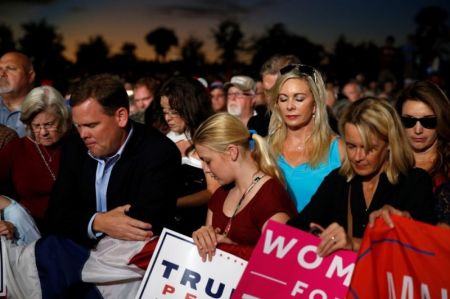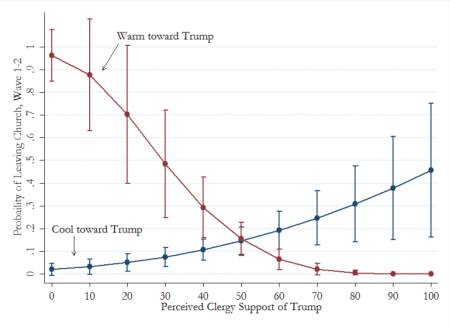Some Evangelicals Left Church Over Trump, but Not the Ones You'd Expect

Some evangelicals left their church due to politics after last year's heated presidential election, but in unexpected ways.
An large number of Christians left their churches following last November's election won by President Donald Trump, including 10 percent of evangelicals who reported leaving their houses of worship before last December, a new study has found.
Following the Nov. 8 election, three political science professors conducted a survey of 957 individuals from across the United States who were among 2,500 people previously surveyed in September in an attempt to "to assess how politics might shape church membership" and assess if the "conflicting sentiment" surrounding Trump was "more likely to drive some out of their houses of worship."
In total, 14 percent of respondents who said they attend a house of worship reported leaving their churches by mid-November. When broken up into religious demographics, one in 10 evangelicals reported leaving their churches, while 11 percent of Catholic respondents said the same. Eighteen percent of mainline Protestants also reported leaving their houses of worship.
"This represents an enormous amount of churn in the religious economy," professors Paul A. Djupe, Anand E. Sokhey and Jacob R. Neiheisel wrote in an analysis published on the blog Religion in Public.
"But was that churn influenced by politics? To find out if they attended a 'political church,' we asked respondents if their clergy addressed any of eight political topics. We also asked, more generally, if seeing evidence of politics reminded them of how divisive politics has become," the professors continued. "About 15 percent of those who believe that American politics has become divisive left their political houses of worship. Of those who don't think politics is inherently divisive, close to none left their political house of worship."
In the survey, evangelicals were asked to identify their own level of support for Trump and then estimate their church leader's support for Trump. On 0-to-100 scale, Trump's average level of support from respondents was just 48, while the perceived support for Trump from clergymen was only two points higher at 50.
The professors found that the two groups that were the most likely to leave their churches were Trump supporters who felt their clergy didn't support him and those who opposed Trump and believed their church leaders strongly supported the billionaire real estate mogul.
While some of the media coverage might lead to the impression that church attendance was harmed by clergy support for Trump, many evangelicals seemingly left because their pastor didn't support Trump. Trump supporters who perceived a lack of Trump support from the pulpit were actually more likely to leave than Trump opponents who thought their pastor supported Trump.
"This finding might help explain why evangelical clergy appear to have had little to say about Trump in their churches this fall," the professors wrote. "It's very likely that they were concerned about alienating some of their flock."

A line graph published with the analysis shows that respondents who were extremely supportive of Trump but attended churches with clergy who they believed were highly opposed to Trump were almost twice as likely to leave their churches than "NeverTrump" churchgoers who attended a church with a perceived Trump-supporting pastor.
In their analysis, the professors point out that such a large churn in church membership is not unique to the 2016 election or the Trump campaign, adding that they have two decades of gathered data that shows "marginal attenders leave churches when they sense political disagreement."
"More specifically, for 20 years, liberal to moderate evangelicals have been leaving their churches because they disagree with the Christian right," the analysis reads. "This is important because it allows us to recognize that this sorting process is plural, local, and continual. It is not something owned by the left or right, but a regular and expected part of life in all religious organizations."
"People leaving their houses of worship over political disagreements is natural and to be expected," they added. "It's certainly happened frequently, sometimes explosively, over the history of religion."
The professors explain that the people most likely to leave their church over political disagreement are usually "infrequent attendees."
Djupe is an associate professor of political science at Denison University and a scholar affiliated with the Washington, D.C.-based Public Religion Research Institute. Neiheisel is an assistant political science professor at the University at Buffalo. Sokhey is an associate professor of political science at the University of Colorado at Boulder and the associate director of the American Politics Research Lab.
Djupe and Sokhey also participated in a study published last year that found that evangelicals were more opposed to Trump after hearing various warnings about how Trump's appeal to evangelicals "sounds dangerously close to Satan's offer to Jesus in Luke 4:9" or how Trump "runs directly against Matthew 25:40."





















